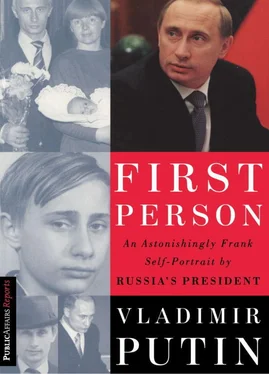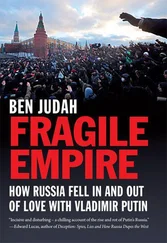Vladimir Putin - First Person
Здесь есть возможность читать онлайн «Vladimir Putin - First Person» весь текст электронной книги совершенно бесплатно (целиком полную версию без сокращений). В некоторых случаях можно слушать аудио, скачать через торрент в формате fb2 и присутствует краткое содержание. Город: New York, Год выпуска: 2000, ISBN: 2000, Издательство: PublicAffairs, Жанр: Биографии и Мемуары, Политика, Политика, Публицистика, на английском языке. Описание произведения, (предисловие) а так же отзывы посетителей доступны на портале библиотеки ЛибКат.
- Название:First Person
- Автор:
- Издательство:PublicAffairs
- Жанр:
- Год:2000
- Город:New York
- ISBN:978-0-786-72327-0
- Рейтинг книги:3 / 5. Голосов: 1
-
Избранное:Добавить в избранное
- Отзывы:
-
Ваша оценка:
- 60
- 1
- 2
- 3
- 4
- 5
First Person: краткое содержание, описание и аннотация
Предлагаем к чтению аннотацию, описание, краткое содержание или предисловие (зависит от того, что написал сам автор книги «First Person»). Если вы не нашли необходимую информацию о книге — напишите в комментариях, мы постараемся отыскать её.
First Person — читать онлайн бесплатно полную книгу (весь текст) целиком
Ниже представлен текст книги, разбитый по страницам. Система сохранения места последней прочитанной страницы, позволяет с удобством читать онлайн бесплатно книгу «First Person», без необходимости каждый раз заново искать на чём Вы остановились. Поставьте закладку, и сможете в любой момент перейти на страницу, на которой закончили чтение.
Интервал:
Закладка:
Then he found your mother? They were reunited?
No, he didn’t get a chance to look for her. They sent him right back into combat. He wound up in another tight spot, the so-called Neva Nickel. This was a small, circular area. If you stand with your back to Lake Ladoga, it’s on the left bank of the Neva River. The German troops had seized everything except for this small plot of land. And our guys held that spot through the entire blockade, calculating that it would play a role in the final breakthrough. The Germans kept trying to capture it. A fantastic number of bombs were dropped on every square meter of that bit of turf—even by the standards of that war. It was a monstrous massacre. But to be sure, the Neva Nickel played an important role in the end.
Don’t you think that we paid too high a price for that little piece of land?
I think that there are always a lot of mistakes made in war. That’s inevitable. But when you are fighting, if you keep thinking that everybody around you is always making mistakes, you’ll never win. You have to take a pragmatic attitude. And you have to keep thinking of victory. And they were thinking of victory then.
My father was severely wounded in the “Nickel.” Once he and another soldier were ordered to capture a prisoner who might talk during interrogation. They crawled up to a foxhole and were just settling in to wait, when suddenly a German came out. The German was surprised, and so were they. The German recovered first, took a grenade out of his pocket, threw it at my father and the other soldier, and calmly went on his way. Life is such a simple little thing, really.
How do you know all this? You said your parents didn’t like to talk about themselves.
This is a story that my father told me. The German was probably convinced that he had killed the Russians. But my father survived, although his legs were shot through with shrapnel. Our soldiers dragged him out of there several hours later.
Across the front line?
You guessed it. The nearest hospital was in the city, and in order to get there, they had to drag him all the way across the Neva.
Everyone knew that this would be suicide, because every centimeter of that territory was being shot up. No commander would have issued such an order, of course. And nobody was volunteering. My father had already lost so much blood that it was clear he was going to die soon if they left him there.
Coincidentally, a soldier who happened to be an old neighbor from back home came across him. Without a word, he sized up the situation, hauled my father up onto his back, and carried him across the frozen Neva to the other side. They made an ideal target, and yet they survived. This neighbor dragged my father to the hospital, said goodbye, and went back to the front line. The fellow told my father that they wouldn’t see each other again. Evidently he didn’t believe he would survive in the “Nickel” and thought that my father didn’t have much of a chance either.
Was he wrong?
Thank God, he was. My father managed to survive. He spent several months in the hospital. My mother found him there. She came to see him every day.
Mama herself was half dead. My father saw the shape she was in and began to give her his own food, hiding it from the nurses. To be sure, they caught on pretty quickly and put a stop to it. The doctors noticed that he was fainting from hunger. When they figured out why, they gave him a stern lecture and wouldn’t let Mama in to see him for awhile. The upshot was that they both survived. Only my father’s injuries left him with a lifelong limp.
And the neighbor?
The neighbor survived, too! After the blockade, he moved to another city. He and my father once met by chance in Leningrad twenty years later. Can you imagine?
Vera Dmitrievna Gurevich:
Volodya’s mother was a very nice person—kind, selfless, the soul of goodness. She was not a very educated woman. I don’t know if she finished even five grades of school. She worked hard her whole life. She was a janitor, took deliveries in a bakery at night, and washed test tubes in a laboratory. I think she even worked as a guard at a store at one time.
Volodya’s papa worked as a toolmaker in a factory. He was much liked and appreciated as a ready and willing worker. For a long time, incidentally, he didn’t collect disability, although one of his legs was really crippled. He was the one who usually cooked at home. He used to make a wonderful aspic. We remember that Putin aspic to this day. Nobody could make aspic like he did.
After the war my father was demobilized and went to work as a skilled laborer at the Yegorov Train Car Factory. There is a little plaque in each metro car that says, “This is car number such-and-such, manufactured at the Yegorov Train Car Factory.”
The factory gave Papa a room in a communal apartment in a typical St. Petersburg building on Baskov Lane, in the center of town. It had an inner airshaft for a courtyard, and my parents lived on the fifth floor. There was no elevator.
Before the war, my parents had half of a house in Peterhof. They were very proud of their standard of living then. So this was a step down.
Vera Dmitrievna Gurevich:
They had a horrid apartment. It was communal, without any conveniences. There was no hot water, no bathtub. The toilet was horrendous. It ran smack up against a stair landing. And it was so cold—just awful—and the stairway had a freezing metal handrail. The stairs weren’t safe either—there were gaps everywhere.
There, on that stair landing, I got a quick and lasting lesson in the meaning of the word cornered . There were hordes of rats in the front entryway. My friends and I used to chase them around with sticks. Once I spotted a huge rat and pursued it down the hall until I drove it into a corner. It had nowhere to run. Suddenly it lashed around and threw itself at me. I was surprised and frightened. Now the rat was chasing me. It jumped across the landing and down the stairs. Luckily, I was a little faster and I managed to slam the door shut in its nose.
Vera Dmitrievna Gurevich:
There was practically no kitchen. It was just a square, dark hallway without windows. A gas burner stood on one side and a sink on the other. There was no room to move around.
Behind this so-called kitchen lived the neighbors, a family of three. And other neighbors, a middle-aged couple, were next door. The apartment was communal. And the Putins were squeezed into one room. By the standards of those days it was decent, though, because it measured about 20 meters square.
A Jewish family—an elderly couple and their daughter, Hava—lived in our communal apartment. Hava was a grown woman, but as the adults used to say, her life hadn’t turned out well. She had never married, and she still lived with her parents.
Her father was a tailor, and although he seemed quite elderly, he would stitch on his sewing machine for whole days at a time. They were religious Jews. They did not work on the Sabbath, and the old man would recite the Talmud, droning away. Once, I couldn’t hold back any longer and asked what he was chanting. He explained about the Talmud, and I immediately lost interest.
As is usually the case in a communal apartment, people clashed now and then. I always wanted to defend my parents, and speak up on their behalf. I should explain here that I got along very well with the elderly couple, and often played on their side of the apartment. Well, one day, when they were having words with my parents, I jumped in. My parents were furious. Their reaction came as a complete shock to me; it was incomprehensible. I was sticking up for them, and they shot back with, “Mind your own business!” Why? I just couldn’t understand it. Later, I realized that my parents considered my good rapport with the old couple, and the couple’s affection for me, much more important than those petty kitchen spats. After that incident, I never got involved in the kitchen quarrels again. As soon as they started fighting, I simply went back into our room, or over to the old folks’ room. It didn’t matter to me which.
Читать дальшеИнтервал:
Закладка:
Похожие книги на «First Person»
Представляем Вашему вниманию похожие книги на «First Person» списком для выбора. Мы отобрали схожую по названию и смыслу литературу в надежде предоставить читателям больше вариантов отыскать новые, интересные, ещё непрочитанные произведения.
Обсуждение, отзывы о книге «First Person» и просто собственные мнения читателей. Оставьте ваши комментарии, напишите, что Вы думаете о произведении, его смысле или главных героях. Укажите что конкретно понравилось, а что нет, и почему Вы так считаете.












